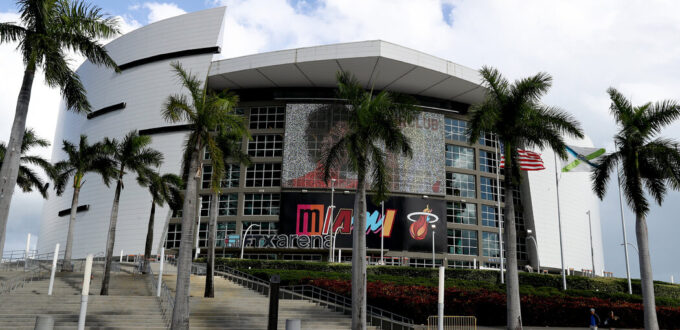The cryptocurrency exchange’s sudden collapse puts deals with teams, leagues and counties worth hundreds of millions of dollars in doubt.

For sports fans, FTX was suddenly everywhere. The National Basketball Association’s Miami Heat played in FTX Arena. Major League Baseball umpires wore an FTX patch on their uniforms. Mercedes-Benz’s Formula 1 racecars sported the FTX logo.
Now, the future of these and many other sponsorship deals with the beleaguered crypto exchange are hanging in the balance, with hundreds of millions of dollars at stake.
This week, what was essentially a run on deposits pushed FTX to the brink of collapse. Binance, a rival exchange, said it would buy FTX before abruptly pulling out of the deal on Wednesday. Now, FTX is scrambling for a lifeline. The total amount that the exchange owes its customers is unclear, though it may be as much as $8 billion. FTX did not respond to requests for comment.
Since its founding in 2019, FTX — run by Sam Bankman-Fried, a 30-year-old entrepreneur, philanthropist and political donor — had gone on a tear signing prestigious sports partnerships.
Last year, FTX bought the naming rights for the Heat’s arena, signing a 19-year deal with the team and Miami-Dade County, Fla., for $135 million. It spent lavishly over the last couple years on deals with top athletes, including Tom Brady, Naomi Osaka, Steph Curry and Shohei Ohtani, and on nonfungible token and crypto partnerships with teams including the Golden State Warriors and the Washington Capitals.
The Mercedes-AMG Petronas Formula 1 team named FTX its cryptocurrency exchange partner. And a professional e-sports team, TSM, agreed to be paid $210 million from FTX over 10 years to change its name to TSM FTX. The exchange spent millions on a Super Bowl ad this year starring Larry David.
If FTX misses payments, teams and organizations may try to recover money through litigation and look for a replacement sponsor, said Marty Conway, an adjunct professor of sports management at Georgetown University.
In an email on Thursday, Natalia Jaramillo, a spokeswoman for the mayor’s office in Miami-Dade County, called the FTX-Miami deal “an evolving situation,” and said the county was reviewing the crypto exchange’s financial situation.
“Should FTX be unable to meet their financial obligations under the naming rights deal,” she added, “the county will explore all legal remedies.”
Cassandra Behar, a spokeswoman for the Heat, declined to comment.
Image
In June 2021, Major League Baseball and the crypto exchange announced what they were calling a long-term, global partnership. The deal came with swag: The umpires would wear patches with the logo of FTX.US, the exchange’s smaller U.S. affiliate.
FTX’s collapse sent a shudder through the crypto industry, which has spent billions of dollars on sports marketing in recent years. Binance has a partnership with the soccer star Cristiano Ronaldo. A Los Angeles arena, formerly the Staples Center, and a Formula 1 race were named for Crypto.com.
Stadium rights are attractive marketing tools for companies in emerging product categories like crypto, said John Fortunato, a professor of communications at Fordham University.
“It’s a vehicle for exposure that’s unparalleled,” he said. If deals fall through, he added, stadiums can generally find new sponsors.
Naming agreements have occasionally dissolved in times of crisis. “I consider this probably the third wave of corporate naming resets,” Mr. Conway said, citing the dot-com bubble burst in 2000 and the 2008 recession as the first and second waves.
In a notable example in 2002, executives of the Houston Astros agreed to buy back naming rights from Enron, the disgraced energy company. Enron Field later became Minute Maid Park.
Brands may reassess their relationships with FTX in light of the turmoil, Mr. Conway said, with teams asking themselves whether they would be better off with a more stable partner. “Some of these organizations,” he said, “have to make a decision: Is it in their best brand interest?”
He added that other sports organizations might be checking in on the stability of their brand partners. “It’s a bit of a canary-in-the-coal-mine moment,” Mr. Conway said.


No Comments Yet